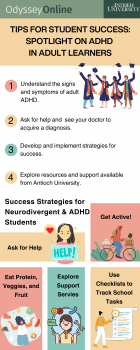I dropped out of university twenty seven years ago, a victim of undiagnosed Attention Deficit Hyperactivity Disorder (ADHD). At the time, I did not understand that students who struggle with ADHD are three times more likely to drop out of university than their non-affected peers. (Note: It’s NOT due to lack of commitment or will power, or aren’t intelligent!) I was also unaware that over 75% of adults with ADHD are undiagnosed. What I did understand were feelings of failure and shame that would lurk on the edges of my life until I discovered the root of my struggles.
Identifying adult ADHD is the first step in creating a successful student experience. Begin by gathering information regarding the signs and symptoms of ADHD, including access to free online testing; go on to implement strategies for success in managing ADHD; and be sure to explore the resources and support available to Antioch students.
Identifying ADHD in Adults
Studies estimate that over 15% of students in higher education are contending with ADHD and its comorbidities that can include depression, anxiety, and substance abuse, and that over 75% of those students are not aware that ADHD is the true culprit. University students with ADHD can experience success, once they are aware and informed.
Do you identify with any of these?
- Struggle to maintain focus for extended periods of time
- Hyperfocus on what you find interesting
- Difficulty in controlling impulses
- Unable to sit still or keep from moving some part of your body
- Poor time management skills
- Inability to stick to a schedule or routine
ADDitude Magazine, a trusted resource for those with ADHD since 1998, offers free, anonymous symptom tests. These tests, as well as the information presented on the types of ADHD, can be the first step to achieving success as a university student. Print your results and continue the conversation with your doctor to proactively address how ADHD can impact your studying.
Student Success Strategies
 Adult students with ADHD can achieve success by identifying their particular struggles, and creating support strategies. ADHD brains are lacking in neurotransmitters that control executive functions such as time management, organization, working memory, and attention. Consider that if you struggle in these areas, it is not because you lack will-power, skills or intellect, but the neurotransmitters required to complete the tasks. As a student with ADHD, you’ll need to invest in strategies to assist your brain.
Adult students with ADHD can achieve success by identifying their particular struggles, and creating support strategies. ADHD brains are lacking in neurotransmitters that control executive functions such as time management, organization, working memory, and attention. Consider that if you struggle in these areas, it is not because you lack will-power, skills or intellect, but the neurotransmitters required to complete the tasks. As a student with ADHD, you’ll need to invest in strategies to assist your brain.
Strategy #1: Utilize Micro-Task Checklists
One particular strategy is to create micro-task checklists. I appreciate the checklist feature available on the AOU Sakai website, and my ADHD brain needs me to break it down one step further by creating a micro-task list for each class, each week. Micro-task checklists give me the added accountability (and dopamine reward!) of crossing off each individual task.
Added benefits of utilizing micro-task checklists are the opportunity to review each assignment prior to starting the class, and releasing the worry and stress of ‘remembering’ which can result in improved sleep and rest.
Strategy #2: Create a Dedicated Workspace
Another helpful strategy for managing ADHD is to create space for schoolwork. Set aside an area for schoolwork where all of your tools are organized and easy to reach. You can tailor this to your life: a room, a table in a room, a storage box organized with all your supplies and tools, or a bag if your physical location changes regularly.
Create a mental workspace to train your brain to focus. Utilize cognition-enhancing music. Over time, students who use the same music for each study session will find that simply hearing the music prepares them to focus and be productive. (Think Sylvester Stallone in the 80’s movie, Over the Top.) This is especially useful if your physical space is flexible – some days I am studying at a local diner, or on my porch, and I also travel. The mental workspace technique has me dialed in and focused no matter where my laptop sits!
Strategy #3: Nourish your Body
 Your body requires specific nourishment as well. You can support your ADHD brain with supplements, such as zinc and omega-3’s, as well as food and beverage choices. ADHD brains may benefit from a cup of coffee, or a protein and complex-carb packed snack. Limit high sugar foods and drinks; instead, snack on veggies, fruit, greek yogurt, cottage cheese, nuts, hard boiled eggs, tuna, baked tofu, tempeh, or cooked, diced chicken.
Your body requires specific nourishment as well. You can support your ADHD brain with supplements, such as zinc and omega-3’s, as well as food and beverage choices. ADHD brains may benefit from a cup of coffee, or a protein and complex-carb packed snack. Limit high sugar foods and drinks; instead, snack on veggies, fruit, greek yogurt, cottage cheese, nuts, hard boiled eggs, tuna, baked tofu, tempeh, or cooked, diced chicken.
Boost your focus and sense of well being with physical activity. Taking a walk before, in the middle, and at the end of your study session is helpful, as is yoga and any outside activity. Also, don’t forget to breathe! Regularly check your body while you’re studying and take deep breaths, rolling your shoulders back and straightening your spine. (Note: I am not a doctor. Please consult your doctor before making any dietary or exercise changes.)
Support Services Available at Antioch University
Antioch University students are fortunate to have a compassionate and informed student success program. Antioch offers all students access to the WellConnect system which provides general coaching as well as ADHD-informed coaching services. Students who take advantage of coaching improve their academic outcomes. Antioch’s Office of Disability Support Services also provides students with forms to request accommodations, a useful tool in creating a successful university experience. Assistant Vice Chancellor for Student Success, Karen Crist, is cheerfully available to answer questions, offer assistance, and point students in the correct direction to receive support for ADHD and its impact. Support is active and ongoing, as each term the student and ODSS staff review their upcoming courses and make adjustments as needed.
Students who utilize the resources available at Antioch can create strategies and identify mechanisms to ensure a positive university experience.
Success Stories
 Students with ADHD are in good company. We’re joining the ranks of such notables as Pulitzer-prize winning journalist Katherine Ellison, Olympic gold-medalist Simone Biles, billionaire Richard Branson, and author and journalist Lisa Ling.
Students with ADHD are in good company. We’re joining the ranks of such notables as Pulitzer-prize winning journalist Katherine Ellison, Olympic gold-medalist Simone Biles, billionaire Richard Branson, and author and journalist Lisa Ling.
You can achieve academic success when you are aware of the unique challenges that ADHD presents, actively work to understand and mitigate its effects, create structure and coping mechanisms, and accept the assistance and support offered by Antioch’s support services. At fifty years old, I am finally enjoying the thrill of academic success, thanks to the years I’ve spent understanding my brain —and so can you!




